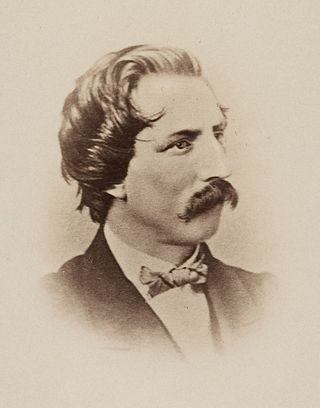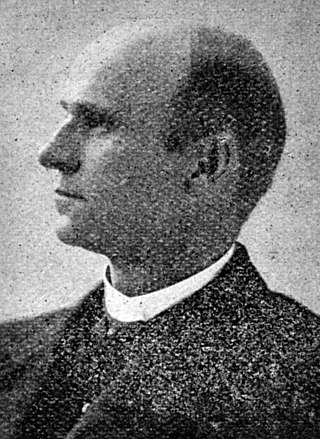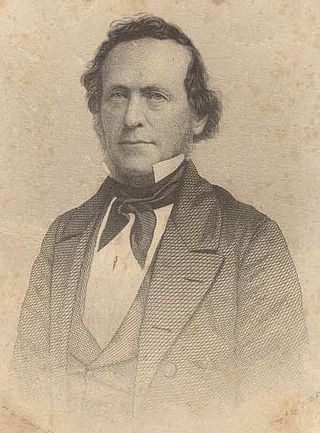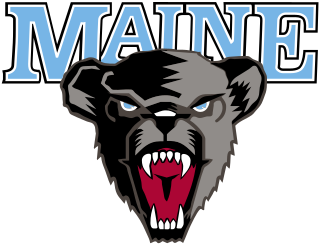
Charles Farrar Browne was an American humor writer, better known under his nom de plume, Artemus Ward, which as a character, an illiterate rube with "Yankee common sense", Browne also played in public performances. He is considered to be America's first stand-up comedian. His birth name was Brown but he added the "e" after he became famous.

A humorist is an intellectual who uses humor, or wit, in writing or public speaking, but is not an artist who seeks only to elicit laughter. Humorists are distinct from comedians, who are show business entertainers whose business is to make an audience laugh. It is possible to play both roles in the course of a career. A raconteur is one who tells anecdotes in a skillful and amusing way.
"Down East", also "Downeast", is a term for parts of eastern coastal New England and Canada, particularly the U.S. state of Maine and Canada's Maritime Provinces, an area that closely corresponds to the historical French territory of Acadia. The phrase apparently derives from sailing terminology: sailors from western ports sailed downwind toward the east to reach the area.
A Boston accent is a local accent of Eastern New England English, native specifically to the city of Boston and its suburbs. Northeastern New England English is classified as traditionally including New Hampshire, Maine, and all of eastern Massachusetts, while some uniquely local vocabulary appears only around Boston. A 2006 study co-authored by William Labov claims that the accent remains relatively stable, though a 2018 study suggests the accent's traditional features may be retreating, particularly among the city's younger residents, and becoming increasingly confined to the historically Irish-American neighborhood of South Boston.

Edgar Wilson "Bill" Nye was an American humorist. He was also the founder and editor of the Laramie Boomerang.
Eastern New England English, historically known as the Yankee dialect since at least the 19th century, is the traditional regional dialect of Maine, New Hampshire, and the eastern half of Massachusetts. Features of this variety once spanned an even larger dialect area of New England, for example, including the eastern halves of Vermont and Connecticut for those born as late as the early twentieth century. Studies vary as to whether the unique dialect of Rhode Island technically falls within the Eastern New England dialect region.

Justin Elmer Wilson was a Southern American chef and humorist known for his brand of Cajun-inspired cuisine, humor and storytelling.
American humor refers collectively to the conventions and common threads that tie together humor in the United States. It is often defined in comparison to the humor of another country – for example, how it is different from British humor and Canadian humor. It is, however, difficult to say what makes a particular type or subject of humor particularly American. Humor usually concerns aspects of American culture, and depends on the historical and current development of the country's culture. The extent to which an individual will personally find something humorous obviously depends on a host of absolute and relative variables, including, but not limited to geographical location, culture, maturity, level of education, and context. People of different countries will therefore find different situations funny. Just as American culture has many aspects which differ from other nations, these cultural differences may be a barrier to how humor translates to other countries.

Tim Sample is a Maine humorist.

Seba Smith was an American humorist and writer. He was married to Elizabeth Oakes Smith, also a writer, and he was the father of Appleton Oaksmith.

The Maine Black Bears are the athletic teams that represent the University of Maine. A member of the America East Conference, the University of Maine sponsors teams in eight men's and nine women's NCAA sanctioned sports. The men's and women's ice hockey teams are members of Hockey East, and the football team is an associate member of the Coastal Athletic Association.

Stanley Shapiro was an American screenwriter and producer responsible for three of Doris Day's most successful films.
Marshall Dodge (1935–1982) was a Maine humorist.

The Story of Will Rogers is a 1952 American Comedy Western film biography of humorist and movie star Will Rogers, directed by Michael Curtiz and starring Will Rogers Jr. as his father. The supporting cast features and Jane Wyman. The film's screenplay was based on the true short story "Uncle Clem's Boy" by Rogers' widow Betty Blake, which was published in The Saturday Evening Post in 1940.
Wesley McNair is an American poet, writer, editor, and professor. He has authored 10 volumes of poetry, most recently, Lovers of the Lost: New & Selected Poems, The Lost Child: Ozark Poems, The Unfastening, and Dwellers in the House of the Lord. He has also written three books of prose, including a memoir, The Words I Chose: A Memoir of Family and Poetry. In addition, he has edited several anthologies of Maine writing, and served as a guest editor in poetry for the 2010 Pushcart Prize Annual.

Joe Perham was an American humorist, known for his "Down East Maine" humor. Perham's humor style was an influence on Tim Sample. Sample has described Perham as a "seriously funny guy with a professionally honed native wit, which inevitably leaves his audiences weak from laughter."
The culture of New England comprises a shared heritage and culture primarily shaped by its indigenous peoples, early English colonists, and waves of immigration from Europe, Asia, Africa, and the Americas. In contrast to other American regions, most of New England's earliest Puritan settlers came from eastern England, contributing to New England's distinctive accents, foods, customs, and social structures.
The Maine accent is the local traditional accent of Eastern New England English spoken in parts of Maine, especially along the "Down East" and "Mid Coast" seaside regions. It is characterized by a variety of features, particularly among older speakers, including r-dropping (non-rhoticity), resistance to the horse–hoarse merger, and a deletion or "breaking" of certain syllables. The traditional Maine accent is rapidly declining; a 2013 study of Portland speakers found the older horse–hoarse merger to be currently embraced by all ages; however, it also found the newer cot–caught merger to be resisted, despite the latter being typical among other Eastern New England speakers, even well-reported in the 1990s in Portland itself. The merger is also widely reported elsewhere in Maine as of 2018, particularly outside the urban areas. In the northern region of Maine along the Quebec and the New-Brunswick border, Franco-Americans may show French-language influences in their English. Certain vocabulary is also unique to Maine.
Robert Skoglund, known professionally as The humble Farmer, is a humorist, columnist and radio personality.









